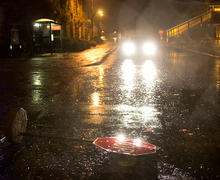University must find way to increase aid
Brandon Peery may not be on the Hill this time next year, not because the freshman mechanical engineering major can’t keep up with his schoolwork, not because he can’t handle the snow and especially not because he’s sick of being harassed by the panhandlers on Marshall Street.
By the spring 2007 semester, Peery and his family probably won’t be able to afford Syracuse University’s hefty tuition.
Tuition is slated to increase from $27,210 to $28,820. Room and board will also go up at the same rate. (The actual cost varies depending on the type of room and meal plan chosen.) All together, the average student is looking at about a $2,000 increase.
It’s tough for students like Peery to keep up, even with financial aid.
‘A lot of kids would be like, ‘You’re getting 75 percent of your tuition paid, what’s another two grand?’ But two grand is a lot to me,’ Peery said.
The simple answer would be for SU to offer more financial aid to match the 5.9 percent hike in tuition, but that’s easier said than done. The university will save 35.5 percent of its tuition income next year for financial aid in the form of need-based and merit-based grants. This ‘discount rate’ is higher than it has been in previous years, and has allowed for a larger, more diverse freshman class to come to SU, said Gerry Mager, the chair of the University Senate Budget Committee, which approved the new tuition increase.
That means all you kids who made straight A’s in high school will continue to get your dean’s, chancellor’s or founder’s scholarships (worth up to $12,000 a year) whether you actually need it or not. And I don’t blame you. Who could say no when SU is willing to shove a couple extra thousand in your face for getting that 1400 on your SAT?
Peery was awarded the $12,000, along with enough loans to cover the bulk of his tuition. But that hasn’t kept his mother, Joan Peery, from going to school to upgrade her teaching license so she can go back to work and help out with the rest of the cost.
‘I worked my butt off to get through college. I worked in a factory for five years,’ Joan Peery said. ‘I wanted to make it easier for my kids.’
But the rest of the money is left up for grabs for those students who simply can’t afford to attend a school with the price tag SU carries. Not everyone gets a fair share either. Those who need the most, get the most, according to Chris Walsh, the dean of financial aid at SU. Those who don’t are either offered loans (which still have to be paid back eventually) or must take on the burden themselves.
The SU administration is already at work on a campaign that is expected to bring in massive amounts of revenue throughout the next several years, some of which can be used as grants for students. It is also supposed to have specialized programs that specifically find aid for students from low and middle-income families.
It will also cure cancer, create an amusement park on the Quad and even fund the creation of a time machine to go back and prevent Brutus from stabbing Caesar. There’s nothing money can’t fix.
But that does nothing for the students that need the aid now. Large-scale fund-raisers like the chancellor’s take years to complete. Waiting that long for aid to come is unacceptable. SU needs to find the funds now. By the time next year’s freshman class graduates in 2010, tuition, room and board will hit the $50,000 mark.
That’s quite an intimidating figure, no matter what financial background you come from. It’s even worse for the Peery family.
‘The breaking point may come second semester next year,’ Joan Peery said of paying next year’s tuition. ‘Even if (Brandon) gets what he got this year, second semester could be bad.’
So when will Syracuse University hit its own breaking point, the point where the average student simply won’t be able to afford tuition here? Let’s hope we never have to see it.
Published on February 9, 2006 at 12:00 pm





